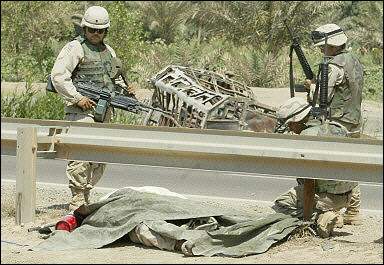by yankee come home
Thursday, Jul. 17, 2003 at 7:02 AM
"Drip, drip, drip"... can you hear that sound? It's not the sound of oil entering American SUV's... it's the sound of blood hitting Iraqi sand.

another-dead-soldier.jpg, image/jpeg, 384x265
Attacks Kill U.S. Soldier, Pro-American Mayor in Iraq
By Borzou Daragahi
The Associated Press
Wednesday, July 16, 2003
BAGHDAD, Iraq -- A U.S. soldier and an eight-year-old Iraqi child were killed in and around the capital Wednesday, while a Pro-American mayor of Hadithah in western Iraq was shot to death along with one of his nine sons, the U.S. military says.
The soldier was killed in a rocket-propelled grenade attack on a supply convoy west of Baghdad near the Abu Ghraib prison, a U.S. military spokesman said.
The grenade blasted into the soldier's truck, hurling him out, as the 20-vehicle convoy passed along a main highway Wednesday morning. Soldiers at first believed a bomb was remotely detonated as the convoy passed.
In regard to the attack on the mayor, the U.S. military confirmed reports by the Arab satellite network Al-Jazeera that Mohammed Nayil al-Jurayfi's car was shot up by unidentified attackers as he drove through the city of about 150,000 about 150 miles northwest of Baghdad.
The Qatar-based broadcaster said al-Jurayfi's car caught fire after the attack. Al-Jazeera also said residents of the city had accused the mayor of collaborating with coalition forces.
Sgt. Diego Baez, who escaped without injury from the attack on the convoy that killed the U.S. soldier, wept over his comrade's death. "We slept next to each other just last night. He was my best friend," Baez said.
U.S. soldiers have come under increasingly ferocious attacks in recent weeks - reaching an average of 12 attacks a day. A total 33 U.S. soldiers have been killed in hostile action since President Bush declared an end to major hostilities on May 1.
A half hour after the blast, the truck was still burning on the road near Abu Ghraib, just west of Baghdad, site of Saddam's most notorious prison. The convoy, made up of reservists from a supply unit based in Puerto Rico, had been heading to a U.S. base near the Jordanian border. "We need more protection. We've seen enough. We've stayed in Iraq long enough," said Spc. Carlos McKenzie, a member of the convoy.
After the attack, troops began house-to-house searches in nearby villages. One resident, Mohammed al-Qazi, said the bombing was the work of men from the tense cities of Fallujah and Ramadi, farther down the road. "It was not people from Abu Ghraib," he said. Those cities are part of the so-called "Sunni Triangle," an area west and north of Baghdad where insurgents have been carrying out attacks against the American occupation force at a rate of 12 each day.
In the attack that killed the Iraqi child, an assailant threw a grenade into a U.S. military vehicle guarding a bank in the upscale al-Mansour neighborhood in west Baghdad. The soldier was injured and taken to a military hospital along with four adult Iraqi bystanders who were also injured
.
In the extreme south of Baghdad, an explosion badly damaged a U.S. Humvee and three U.S. casualties were seen taken away by an Iraqi witness. The coalition had no information on that incident. "We were home when we heard a strong explosion and we came out and we saw a U.S. vehicle on fire," said Ameer Jabar, a 22-year-old student.
Also Wednesday, a U.S. Marine died in the southern city of Hilla when he fell from the roof of a building he was guarding, the military said. The soldier was taken to a hospital but died of his injuries.
Many American soldiers thought they'd be home this summer, but their hopes were dashed in a U.S. Army e-mail to spouses Sunday. "I'm tired of going to bed wondering if I'm going to wake up in the morning," said Spc. David Myers Jr. of the 3rd Infantry Division's 3rd Battalion, 7th Infantry Regiment in Habaniyah, west of Baghdad.
The increasing frequency and sophistication of the attacks - and growing doubts about the basis for the war - have contributed to the decision by some countries not to contribute troops. On Tuesday, France ruled out sending troops, following India and Germany.
© 2003 The Associated Press

